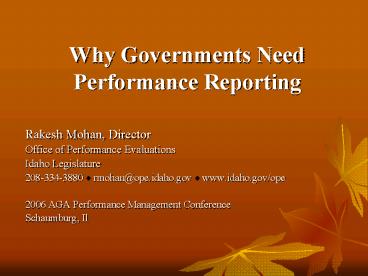Why Governments Need Performance Reporting - PowerPoint PPT Presentation
1 / 19
Title:
Why Governments Need Performance Reporting
Description:
Joint Legislative Audit and Review Committee, Washington Legislature. ... NLPES News, no. 83, Fall 2002, http://www.ncsl.org/programs/nlpes/news/news1002.htm. ... – PowerPoint PPT presentation
Number of Views:12
Avg rating:3.0/5.0
Title: Why Governments Need Performance Reporting
1
Why Governments Need Performance Reporting
- Rakesh Mohan, Director
- Office of Performance Evaluations
- Idaho Legislature
- 208-334-3880 ? rmohan_at_ope.idaho.gov ?
www.idaho.gov/ope - 2006 AGA Performance Management Conference
- Schaumburg, Il
2
Abstract
- Imagine a world without report cards, results,
or benchmarksthe Olympics would be boring, we
wouldnt know which car has the highest safety
rating, nor would we know how our kids are doing
in school. Report cards, results, and benchmarks
are all part of performance reporting we need
them to make informed choices, prioritize our
resources, and excel in our endeavors. Likewise,
good government is not possible without an
effective accountability system. Citizens need
performance reporting to hold their governments
accountable.
3
Why We Need Performance Reporting
- Accountability
- Policy and budget decisions
- Program evaluation
- Program monitoring
4
Common Performance Audit Findings
- Policy intent, program goals, and performance
expectations are not clear - Performance indicators used by program officials
are not aligned with policy intent - Reported performance information is not useful to
policymakers - Quality of performance information reported is
questionable
5
Policy Articulation
Worst Scenario
6
Washington Linked Deposit
- Intent/Purpose
- Remedy the lack of access to capital by minority
and womens business enterprises - Data Tracked
- Number of minority- and women-owned small
businesses receiving reduced interest rate loans - Amount of money loaned
- Disconnect between policy intent and program
focus as implemented
7
Washington Jobs for the Environment
- Intent/Purpose
- Measurable improvements in water and habitat
quality - Economic stability in the targeted areas
- Data Tracked
- Types and amount of work done
- Types of jobs created, amount of wages paid, and
number of people employed - Disconnect between policy intent and program
focus as implemented
8
Idaho K-12 Technology Initiatives
- Performance measurement focused on
- How much money was given in grants
- How many computers were acquired
- Management did not know
- Whether districts had achieved their goals
- Where districts needed to go next
- Cost-effectiveness of technology acquisition
- Districts capacity to meet new challenges
9
Strategic Planning andPerformance Measurement in
Idaho
- Idaho Code enacted in 1993 requires
- Strategic plans and annual updates
- Annual performance reports
- Intent Improve agency performance and
government accountability - Performance information is required as part of
executive budget
10
What They Said
- Legislature
- Performance information reported was not useful
for making budget and policy decisions - Agencies
- Performance measurement process was not useful
for managing programs - Legislative Staff
- Performance information not useful for preparing
budgets or conducting performance audits
11
Challenges in IntegratingMeasurement with
Management
- Stakeholder input
- Data limitations
- Quality of performance information
- Cost concerns
12
House Bill No. 3002005 Legislative Session
- Strengthens and streamlines performance
measurement requirements - Provides for legislative involvement
- Requires agencies to provide basic profile
informationstatutory authority, revenue and
expenditure breakdowns, and types of cases
managed or key services provided - Requires agencies to report key performance
measures with benchmarks and explanations
13
Idahos Performance Measurement Process
1. Agency receives program authority
appropriations
2. Agency develops strategic plan
Training to agency staff
7. Legislative committees provide feedback to
agencies, request evaluations, and consider
information for making policy and budget decisions
3. Agency develops performance measures
Legislative feedback
6. Agency presentsperformance information to
legislative committees
4. Agency provides services, collects data
5. Agency provides performance information to
executive legislative budget staff
Training to legislators
14
Effective Performance Measurement
- Treat performance measurement as an inherently
political process - Include stakeholders
- Define what would constitute program success
- Agree on the cost of measuring success
- Know that the success of performance measurement
rests on the processsimple, understandable,
accessible, and affordable
15
Effective Performance Measurement
- Use performance data, along with other
information, to make policy, budget, and program
decisions - Do not use a single number to paint the picture
- Understand causal relationships
- Use performance measurement to trigger questions,
not to find all of the answers - Identify areas for performance auditing
- Set multi-year performance goals
16
Effective Performance Measurement
- Use targets for providing context
- Use appropriate measures for internal and
external use - Use a few select measures that reflect program
efforts and accomplishments relating to
legislative intent - Review quality of information reported
- Provide training on reporting and use of
performance information
17
AccountabilityCornerstone of Good Government
- Accountability in government does not happen
just because a nation has a democratically
elected government or a constitution that
provides basic rights to its citizen. Both the
leaders and the public have to believe in
accountability and collectively strive to
establish and maintain it. - We cant take accountability in government for
granted it takes a concerted effort of everyone
involved. Performance reporting is one important
step in that effort.
18
References
- Idaho Legislature. House Bill No. 300, 2005
Legislative Session, www3.state.id.us/oasis/H0300.
html. - Joint Legislative Audit and Review Committee,
Washington Legislature. Linked Deposit Program
Sunset Review, Sept. 1999, www1.leg.wa.gov/jlarc/.
- Joint Legislative Audit and Review Committee,
Washington Legislature. Environmental Restoration
Jobs Act, Oct. 1998, www1.leg.wa.gov/jlarc/. - Mohan, R. Understanding Performance
Measurement. NLPES News, no. 83, Fall 2002,
http//www.ncsl.org/programs/nlpes/news/news1002.h
tm.
19
References
- Mohan, R., Tikoo, M., Capela, S., and Bernstein,
D. Increasing Evaluation Use Among Policymakers
Through Performance Measurement. In a
forthcoming volume of New Directions for
Evaluation, R. Mohan and K. Sullivan (eds.),
Spring 2007. - Office of Performance Evaluations, Idaho
Legislature. Strategic Planning and Performance
Measurement, Dec. 2004, www.idaho.gov/ope/public
ations/reports/r0404.htm. - Office of Performance Evaluations, Idaho
Legislature. Public Education Technology
Initiatives, Jan. 2005, www.idaho.gov/ope/publicat
ions/reports/r0501.htm.































